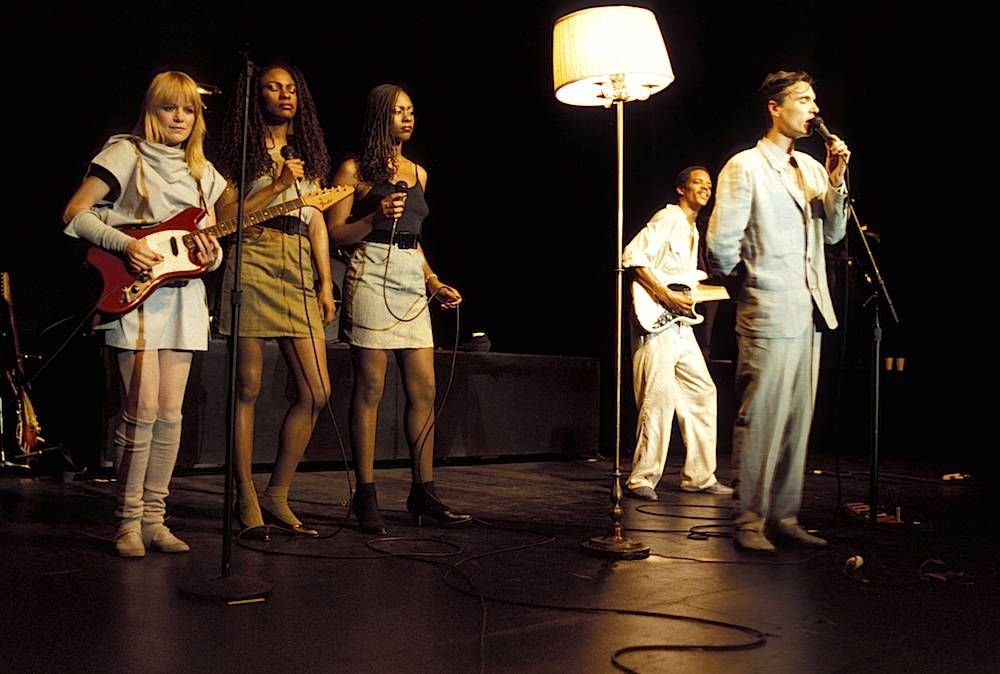STOP MAKING SENSE 40th Anniversary Rerelease
Directing: A-
Writing: A-
Cinematography: B+
Editing: B+
Music: A
Several times while watching Stop Making Semse, the now-classic, cult favorite Talking Heads concert film, I almost thought I was looking at Cillian Murphy. David Byrne, the lead singer of the Talking Heads—which have not released an album of original music as a band in 35 years—was 32 years old at the time of this concert’s filming, in December 1983. (Hence the “40th anniversary” moniker, I guess, even though the film was originally released in October 1984). Cillian Murphy is 47 now. He’d better get on it if he’s ever going to star in a biopic. I’d be there in a flash, anyway.
I have a curious personal history with this band. In spite of collecting the entire discography of many singers and bands from the seventies and eighties, I have never owned any album by the Talking Heads. And yet, as a lover of film, I have genuinely loved both concert films with David Byrne as lead performer. David Byrne’s American Utopia was my 8th-favorite movie of 2020. Having now seen Stop Making Sense in a theater, I think I am just slightly partial to American Utopia, which is, as a recording of a Broadway performance, is much more of a choreographed stage production.
They do make great companion pieces, I think. In 2020, I marveled at David Byrne as an exceptional live vocalist, particularly at the age of 67. Turns out, this was nothing new. To say Byrne is an odd man is an understatement, but his stage presence is undeniable, and his unique singing style still manages to blend perfectly well with backup singer harmonies.
There must be something to the quality of The Talking Heads’s back catalogue, as well as their power over an audience, considering how much I love watching them perform, in spite of having only cursory familiarity with the material. I know the tunes to “Psycho Killer” and “Burning Down the House” and “Once In a Lifetime,” of course, but Stop Making Sense is full of songs I am unaware of having heard anywhere else, and still I am just as into the next one as I am the last.
The presentation of Stop Making Sense is a simple conceit, but a very effective one. It opens with Byrne alone, performing “Psycho Killer” with nothing but a boom box and an acoustic guitar. For the next song, “Heaven,” he sings only with Talking Heads bassist Tina Weymouth. And so it goes with the following songs, each with a new instrument added: drums by Chris Frantz; guitar (and later keyboards) by Jerry Harrison; and an expanding number of supporting instrumentalists. Stagehands either carry or roll out their equipment ahead of time, while Byrne continues performing in front of them.
Even at the age of 32, Byrne’s energy and stamina are stunning. Like all the band members, he sweats a good amount, but never shows any signs of tiring, particularly when it comes to his vocals. He sounds incredible from start to finish.
So: is it “the best concert film of all time,” as considered by many critics? Who am I to argue? Granted, this strikes me as wildly objective. If the Talking Heads’s music doesn’t speak to you, would you still align with this perspective? Granted, this film is also known for some technical innovations, as in its digital audio techniques. I suppose that means this could be called “the Citizen Kane of concert films.” Does that make it the best? Well, it’s excellent, anyway.
If nothing else, it certainly holds up, incredibly well. I find myself wondering what it might be like to watch in a house theater full of fans. I watched this at a 4:20 p.m. screening, with one single other person in the theater. I was super into the music, moving a bit to it, in my sleep. The young woman two seats down from me was not so much as tapping her foot.
I’m glad I got to see it in a theater. There’s no question that, nearly empty theater notwithstanding, it was a far more absorbing experience than it would have been watching at home. I had a blast.
You don’t have to be a Talking Heads fan, but it helps.
Overall: A-

